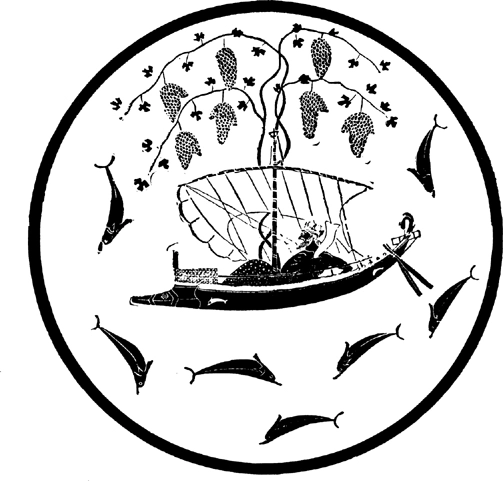And so when he approached with his retinue of exultant Bacchantes to reveal himself as a god, Pentheus ignored the warning of Tiresias, the blind and aged seer, and when he heard that Theban men and women and girls were flocking to adore the new god, he began to rage against them.
“What madness has come upon you?” he asked. “You Thebans, who are descended from the dragon, you who have never retreated from the trumpet that summons to battle, or from the death-bringing sword, will you now surrender to a mob of soft-handed fools and women? And you people of Phoenicia, who came from beyond the sea and founded a city in honor of your old gods, have you forgotten the race of heroes who begot you? Will you suffer an unarmed boy to conquer Thebes, a weakling whose locks drip with myrrh, who wreathes his tender brow with vine-leaves, who goes robed in purple and gold rather than in mail, who cannot master a horse, and is indifferent to wars and feuds? If only you will come to your senses, I shall soon force him to own he is mortal just like myself, who am his cousin; that Zeus is not his father, and that all these rites and mummeries are the invention of a pretender.” And he turned to his servants and commanded them to seize the author of this new madness, wherever they might come upon him, and bring him to the city in chains.
The friends and kinsmen of Pentheus were aghast at his insolent words. His grandfather Cadmus who was still alive though very old, shook his white head in disapproval. But counsel and dissent only served to swell the king’s rage, which leaped over all the stumbling-stones set in his path as an angry river breaks through a dam.
In the meantime his servants returned, and their faces were stained with blood. “Where is Dionysus?” Pentheus shouted to them.
“We could not find him anywhere,” they replied. “But we have brought you one of his followers. He has not been with him very long, it seems.”
Pentheus studied his captive with furious eyes and cried: “You are doomed! You must die on the instant, as a warning example to the rest. What is your name? Who are your parents? Where did you come from? And tell me also why you perform these silly, newfangled rites?”
The prisoner answered, and his voice was calm and without fear. “My name is Acoetes, Maeonia is my country, and my parents are of the common people. Neither fields nor flocks did my father leave me. All he taught me was how to fish with the rod, for this skill was the sole treasure he possessed. Soon I also learned how to manage a ship and to recognize the stars and the constellations, to know the winds, and what harbors are good. I became a seaman. Once, on a voyage to Delos, I came to an unknown coast where we cast anchor. I jumped from the ship, landed on the wet sand, and spent the night ashore without my comrades. The next morning I rose at early dawn and climbed a hill to find out what the winds held in store. In the meantime my comrades had also left the ship and, on my way back, I met them dragging with them a youth they had seized on the empty strand. The boy had a girlish beauty. He was dazed with wine and drowsy, and walked with faltering steps. When I looked at him more closely it seemed to me that his face, and the way he moved and bore himself, betrayed one more than mortal. ‘I do not know what god it is who is hidden within this youth.’ I called to the crew. ‘But I am wholly certain that it is a god.’ Then I turned to the boy. ‘Whoever you may be,’ I said, ‘I implore you to give us your favor and speed our work. Forgive these who carried you off!’

“ ‘What foolishness is this!’ cried one of the men. ‘Leave off praying to him.’ And the others laughed. Blinded by their greed for profit, they took hold of the boy and started dragging him on to the ship. It was in vain that I resisted. The youngest and sturdiest in the mob, a fugitive from a Tyrrhenian city where he had committed murder, took me by the throat and cast me overboard. Had I not caught my foot in the rigging, I would surely have drowned. All this time the boy lay on deck as though in a deep sleep.
1 comment